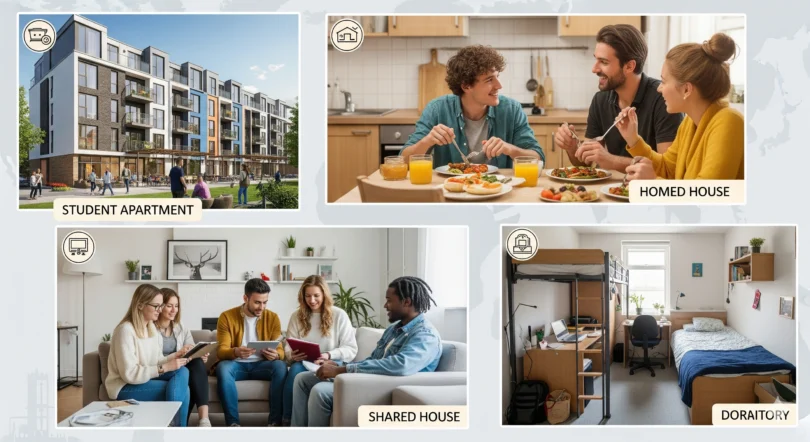Student Accommodation Options Abroad
Introduction
Finding the right student accommodation abroad is a crucial part of planning your international study journey. Your living environment affects your academic performance, social life, and overall experience. With over 14 years of experience advising students on global education, I’ve helped hundreds find accommodations that balance comfort, convenience, and cost-effectiveness.
This guide will help you understand different types of housing, costs, tips for selecting accommodation, and essential things to consider before moving abroad.
1. Types of Student Accommodation Abroad
International students typically have several housing options:
a) University Dormitories / Halls of Residence
- Description: On-campus housing provided by universities.
- Benefits:
- Close to classes, libraries, and campus facilities
- Opportunities to meet other students and participate in events
- Some universities provide meals or kitchen facilities
- Considerations: Limited space; may require early application
b) Private Apartments
- Description: Independent housing rented from private landlords or agencies.
- Benefits:
- More privacy and independence
- Flexibility in location and amenities
- Considerations: Often more expensive; requires handling bills and contracts
c) Shared Housing / Flatmates
- Description: Sharing a house or apartment with other students or young professionals.
- Benefits:
- Lower cost due to shared rent and utilities
- Social opportunities and cultural exchange
- Considerations: Shared responsibilities; need good communication with flatmates
d) Homestays
- Description: Living with a local family while studying abroad.
- Benefits:
- Immersive cultural experience
- Meals and household support provided
- Considerations: Less privacy; strict household rules
2. Cost Considerations for Accommodation
Accommodation costs vary depending on:
- Country and city: Major cities like London, New York, or Sydney are more expensive.
- Type of housing: Dorms are usually cheaper than private apartments.
- Amenities and facilities: Furnished vs. unfurnished, Wi-Fi, heating, laundry.
Average Costs:
- Dormitories: $500–$1,500/month
- Shared apartments: $400–$1,200/month
- Private apartments: $800–$2,500/month
- Homestays: $600–$1,200/month, often including meals
Consultant Tip: Consider your budget, lifestyle, and study needs when choosing accommodation.

Tips for Choosing the Right Accommodation Abroad
3. Tips for Choosing the Right Accommodation Abroad
- Location Matters:
- Close to campus, public transport, grocery stores, and healthcare facilities.
- Safety First:
- Research neighborhood safety, emergency contacts, and student-friendly areas.
- Check Reviews and References:
- Read student testimonials or consult university housing offices.
- Consider Flexibility:
- Short-term leases or contracts may suit students unsure of long-term plans.
- Understand Utilities and Contracts:
- Confirm what’s included in rent and clarify terms of deposit, maintenance, and cancellations.
Consultant Insight: Students who plan ahead and visit accommodation virtually or in-person experience less stress and greater satisfaction.
4. University Support Services for Housing
Most universities offer dedicated support for international students:
- Housing Offices: Assistance with applications, contracts, and legal guidance.
- Orientation Programs: Introduce students to campus facilities and nearby accommodation.
- Online Portals: Lists of available housing, reviews, and roommate matching services.
Pro Tip: Use university-provided resources for reliable and safe housing options.

Cultural Considerations in Student Housing
5. Cultural Considerations in Student Housing
Living abroad is not just about comfort—it’s also about cultural adaptation:
- Shared Spaces: Respect for house rules and diverse backgrounds is key.
- Meal Plans vs. Self-Cooking: Some countries encourage self-cooking while others provide meal plans.
- Noise and Social Life: Dorms may have curfews, while private apartments may allow more freedom.
Consultant Advice: Understanding local customs and regulations ensures a harmonious living experience.
6. How to Apply for Accommodation Abroad
- Early Applications: Dormitory and university-provided housing often fill up quickly.
- Document Requirements: Passport, acceptance letter, financial proof, and application forms.
- Deposit Payment: Many landlords or universities require a refundable security deposit.
- Lease Agreements: Read carefully, including termination clauses and responsibilities.
Pro Tip: Submit your application at least 3–6 months in advance to secure the best options.

Alternatives for Short-Term or Budget-Friendly Housing
7. Alternatives for Short-Term or Budget-Friendly Housing
- Hostels and Guesthouses: Temporary housing before securing long-term accommodation.
- Student Co-Living Spaces: Designed for international students, often with social events and study spaces.
- Airbnb or Short-Term Rentals: Flexible but can be costly; ideal for initial arrival.
Consultant Insight: Temporary housing can bridge the gap while you explore long-term options.
8. Final Checklist for Choosing Student Accommodation Abroad
- Confirm proximity to campus and amenities
- Check safety and neighborhood reviews
- Compare rent, utilities, and other costs
- Understand lease terms and deposit requirements
- Consider cultural fit and roommate preferences
- Plan ahead to meet all application deadlines
Consultant Tip: Choosing the right accommodation enhances academic focus, social engagement, and personal well-being during your study abroad journey.
Conclusion
Student accommodation is more than a place to sleep—it’s a home away from home. Selecting the right type of housing, understanding costs, respecting cultural differences, and planning ahead ensures a successful and enjoyable study abroad experience.










